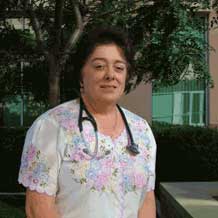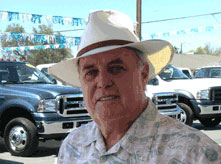It’s not uncommon for farmers and farm workers to sit shoulder-to-shoulder in the spacious waiting room of the Sablan Medical Clinic on Firebaugh’s main thoroughfare. Inside the bustling clinic, Dr. Marcia Sablan and her husband maintain a busy practice they started 24 years ago as newly minted physicians required to serve a rural community as part of a community service requirement.
Marcia Sablan’s Radio Commercial

Dr. Sablan, a native of St. Louis, Mo., didn’t plan on staying in Firebaugh. But the town of 6,000 residents, many of them Spanish-speaking farm employees, grew on her and her husband. “We’ve been here ever since. In fact, we’re starting to see the grandchildren now of some of our earliest patients.”
Dr. Sablan has committed herself to the community in a big way. She and her husband keep their clinic open in the evenings to accommodate farm owners and employees who can’t easily get away from their jobs during the day. And they set aside a significant portion of their calendar for walk-in patients.
She also has served on the Firebaugh City Council for the past 20 years, including a stint as the city’s mayor. And she was appointed to the Bay-Delta Advisory Committee some years ago. It was that experience, Dr. Sablan said, that gave her a complete understanding and appreciation for the vital connection that exists between the supply of water for farms and the health of her community and her patients.
“The farmers get hurt when the water isn’t available but they have more ability to weather the difficult times,” she said. “But the farm workers really suffer because they have far less cushion to fall back on.”
The city also suffers a major financial hit when agricultural water supplies are disrupted. Sales taxes go down, making it harder for the city to provide the critical services the town’s residents need.
“We can’t forget that decisions about water in California have a trickle down effect that impacts the lives and health of real people in towns like Firebaugh,” Dr. Sablan said.


